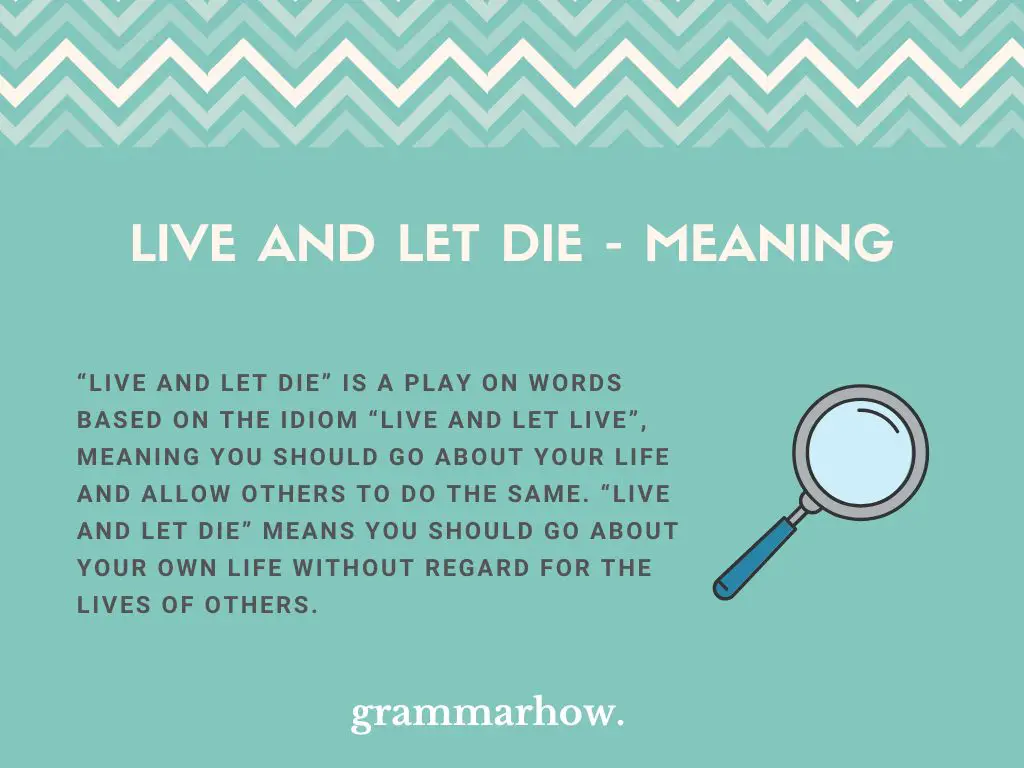Have you ever heard someone use the phrase “live and let die” and been left wondering what exactly that means? Is it an expression encouraging you not to brake for birds while driving or pay attention to where you’re stepping when there are snails on the pavement?
Live and Let Die – Meaning
“Live and let die” is a play on words based on the idiom “live and let live”, meaning you should go about your life and allow others to do the same. “Live and let die” means you should go about your own life without regard for the lives of others.

“Live and let live” asks people to not concern themselves too much with how others might be behaving. It tells you not to judge someone who has a lifestyle that is different from yours but to let them keep on living unrestrained, as long as they allow you to do the same.
“Live and let die”, on the other hand, has a less friendly sentiment. It is saying that you should focus on your own life and priorities, even if that is at the expense of others. Even if it kills them.
It can also be used to say that you should let others make their own decisions, even when the consequences of those decisions might be dangerous.
How to Use “Live and Let Die” in a Sentence
Let’s look at some examples of how to use “live and let die” in a sentence:
- I’m not going to try and help her anymore because all she does is self-sabotage; live and let die, that’s my philosophy now.
- If this ever-changing world that we live in, makes you give up and cry, say live and let die.
- He told me that he’s a spy and that his motto is “live and let die” – how weird is that?
- You can’t save everybody. You need to learn to live and let die.
- Honestly, I don’t care if Sam’s putting himself in danger; it’s his decision, so just live and let die.
Live and Let Die – Origin
This is one phrase where we know exactly who said it first and where it comes from. It’s originally the title of the second novel in the James Bond series by Ian Fleming.
You might have heard of James Bond. He’s kind of a big deal. We know he drinks martinis but we’re not sure how he takes them…
James Bond is a super cool, old-school spy who loves to murder, get drunk, and treat women badly. He’s been having a bit of a makeover in recent years, but back in 1954, when this novel came out, he was very much an all-around uncool dude.
So, from his perspective, the phrase “live and let die” was about how he could live his hardcore, international man of mystery life without worrying about all the people he killed. He had a license to do it, after all.
The novel was adapted into a film with the same name in 1973, which was accompanied by a theme tune of the same name. Originally by The Wings, this Academy Award-winning tune has been famously covered by Guns N’ Roses.
The lyrics acknowledge that “live and let die” originates from the phrase “live and let live”. In the narrative of the song, the misery of the world has led the speaker to change from saying “live and let live” to “live and let die”. What a tragedy.
Phrases That Mean the Opposite of “Live and Let Die”
The one phrase that means the opposite of “live and let die” is its own origin phrase, “live and let live”.
The general sentiment of “live and let die” is to keep out of other people’s business. So, any statement that says you should get involved in the community would be the opposite as well.
Incorrect Ways to Use “Live and Let Die”
It’s incorrect to use the phrase “live and let die” if you’re trying to say that people should have great concern for other people and their problems.
It should also not be used in place of “live and let live”, as these phrases have quite distinct connotations. While “live and let live” calls for acceptance of others, “live and let die” calls for indifference towards others.
In What Situations Can You Use “Live and Let Die”?
You can use the phrase “live and let die” when you want to express that you’re not going to interfere with other people’s business or when you’re telling someone else that they shouldn’t.
You can use it in place of “mind your own business”, or when you intend to put your own pursuits ahead of the wellbeing of others, much like James Bond.

Martin holds a Master’s degree in Finance and International Business. He has six years of experience in professional communication with clients, executives, and colleagues. Furthermore, he has teaching experience from Aarhus University. Martin has been featured as an expert in communication and teaching on Forbes and Shopify. Read more about Martin here.
